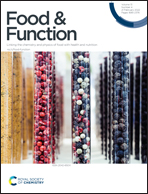A gastro-resistant peptide from Momordica charantia improves diabetic nephropathy in db/db mice via its novel reno-protective and anti-inflammatory activities
Abstract
Diabetic nephropathy (DN), a principal diabetic microvascular complication, is a chronic inflammatory immune disorder. A gastro-resistant peptide mcIRBP-9 from Momordica charantia has shown modulation of blood glucose homeostasis in diabetic mice. Here we conducted a long-term experiment to evaluate the therapeutic effects and mechanisms of mcIRBP-9 on DN. Type 2 diabetic mice (db/db mice) were orally given mcIRBP-9 once daily for 12 consecutive weeks. The amelioration of DN was evaluated by renal function indexes, vascular leakage, and pathological lesions. Possible effective mechanisms of mcIRBP-9 on DN were analyzed by gene expression profiles. A pharmacokinetic study in rats was carried out to evaluate the oral bioavailability of mcIRBP-9. Our data showed that mcIRBP-9 was able to enter systemic circulation in rats after oral administration. In comparison with mock, long-term administration of mcIRBP-9 significantly decreased blood glucose (572.25 ± 1.55 mg dL−1vs. 213.50 ± 163.39 mg dL−1) and HbA1c levels (13.58 ± 0.30% vs. 8.23 ± 2.98%) and improved the survival rate (85.7% vs. 100%) in diabetic mice. mcIRBP-9 ameliorated DN by reducing renal vascular leakage and histopathological changes. mcIRBP-9 altered the pathways involved in inflammatory and immune responses, and the nuclear factor-κB played a central role in the regulation of mcIRBP-9-affected pathways. Moreover, mcIRBP-9 improved the inflammatory characteristic of DN in diabetic and non-diabetic mice. In conclusion, mcIRBP-9 displayed a novel anti-inflammatory activity and exhibited a reno-protective ability in addition to controlling the blood glucose and HbA1c levels. These findings suggested the role of mcIRBP-9 from M. charantia as a nutraceutical agent for diabetes and subsequent DN.



 Please wait while we load your content...
Please wait while we load your content...